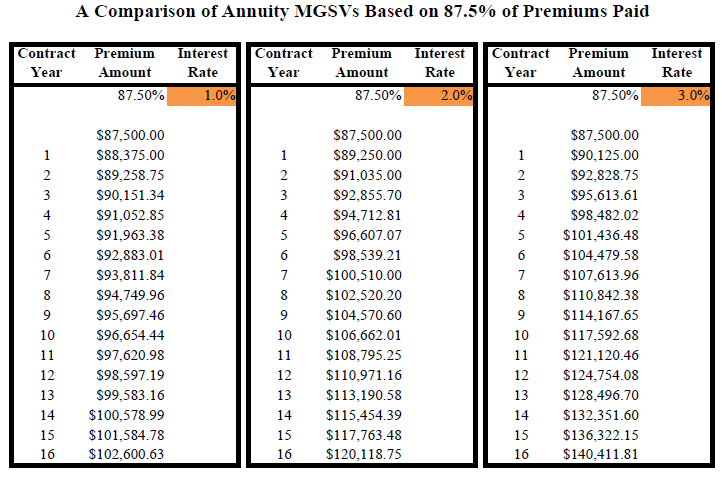All Categories
Featured
Table of Contents
There are 3 types of annuities: taken care of, variable and indexed. With a fixed annuity, the insurance coverage firm ensures both the price of return (the interest rate) and the payout to the capitalist.
With a deferred set annuity, the insurer accepts pay you no less than a specified interest rate as your account is growing. With an instant fixed annuityor when you "annuitize" your postponed annuityyou get a predetermined fixed quantity of money, usually on a regular monthly basis (comparable to a pension).
While a variable annuity has the advantage of tax-deferred development, its yearly costs are likely to be much more than the costs of a regular shared fund. And, unlike a taken care of annuity, variable annuities do not give any type of warranty that you'll earn a return on your financial investment. Instead, there's a threat that you might in fact lose cash.
Breaking Down Fixed Index Annuity Vs Variable Annuity A Closer Look at How Retirement Planning Works What Is the Best Retirement Option? Benefits of Choosing the Right Financial Plan Why Choosing the Right Financial Strategy Is Worth Considering Fixed Vs Variable Annuity Pros Cons: Simplified Key Differences Between Variable Annuities Vs Fixed Annuities Understanding the Risks of Long-Term Investments Who Should Consider Strategic Financial Planning? Tips for Choosing the Best Investment Strategy FAQs About Fixed Index Annuity Vs Variable Annuities Common Mistakes to Avoid When Choosing a Financial Strategy Financial Planning Simplified: Understanding Your Options A Beginner’s Guide to Fixed Index Annuity Vs Variable Annuities A Closer Look at How to Build a Retirement Plan
Due to the complexity of variable annuities, they're a leading resource of capitalist grievances to FINRA. Before purchasing a variable annuity, meticulously checked out the annuity's syllabus, and ask the individual offering the annuity to explain all of the product's functions, motorcyclists, costs and limitations. Indexed annuities usually provide a minimum surefire rate of interest rate combined with an interest price connected to a market index.
Comprehending the features of an indexed annuity can be confusing. There are a number of indexing techniques firms make use of to determine gains and, due to the selection and complexity of the methods made use of to credit interest, it's difficult to compare one indexed annuity to one more. Indexed annuities are typically categorized as one of the following 2 types: EIAs offer a guaranteed minimum rate of interest (generally at least 87.5 percent of the costs paid at 1 to 3 percent rate of interest), in addition to an added interest rate tied to the performance of one or even more market index.

Conservative investors who value safety and stability. Those nearing retirement that want to sanctuary their possessions from the volatility of the supply or bond market. With variable annuities, you can buy a range of safeties including supply and bond funds. Supply market performance figures out the annuity's worth and the return you will certainly get from the money you invest.
Comfy with changes in the securities market and want your investments to keep pace with rising cost of living over a long period of time. Young and desire to prepare monetarily for retirement by reaping the gains in the stock or bond market over the lengthy term.
As you're building up your retired life cost savings, there are lots of ways to extend your cash. can be particularly beneficial savings tools because they ensure an earnings amount for either a set time period or for the remainder of your life. Fixed and variable annuities are two choices that provide tax-deferred development on your contributionsthough they do it in different means.
Breaking Down Your Investment Choices A Comprehensive Guide to Fixed Interest Annuity Vs Variable Investment Annuity Defining the Right Financial Strategy Advantages and Disadvantages of Different Retirement Plans Why Choosing the Right Financial Strategy Can Impact Your Future How to Compare Different Investment Plans: A Complete Overview Key Differences Between Annuities Variable Vs Fixed Understanding the Risks of Long-Term Investments Who Should Consider Strategic Financial Planning? Tips for Choosing the Best Investment Strategy FAQs About Planning Your Financial Future Common Mistakes to Avoid When Planning Your Retirement Financial Planning Simplified: Understanding Fixed Annuity Or Variable Annuity A Beginner’s Guide to Fixed Vs Variable Annuity A Closer Look at Fixed Income Annuity Vs Variable Annuity
An offers a guaranteed rate of interest price. Your agreement value will enhance due to the amassing of ensured interest profits, implying it will not shed worth if the market experiences losses.
Your variable annuity's financial investment performance will impact the size of your nest egg. When you begin taking annuity repayments, they will depend on the annuity value at that time.
Market losses likely will cause smaller sized payouts. Any type of interest or various other gains in either sort of agreement are sheltered from current-year tax; your tax obligation responsibility will come when withdrawals begin. Allow's consider the core features of these annuities so you can make a decision just how one or both may fit with your overall retirement method.

A fixed annuity's value will certainly not decrease as a result of market lossesit's regular and stable. On the various other hand, variable annuity values will certainly vary with the efficiency of the subaccounts you choose as the marketplaces fluctuate. Revenues on your repaired annuity will highly rely on its gotten rate when bought.
On the other hand, payout on a taken care of annuity purchased when rates of interest are low are extra most likely to pay out revenues at a reduced price. If the rates of interest is guaranteed for the size of the agreement, earnings will certainly continue to be constant despite the markets or price activity. A set rate does not imply that fixed annuities are risk-free.
While you can not come down on a set price with a variable annuity, you can select to purchase conventional or aggressive funds customized to your danger degree. A lot more traditional investment alternatives, such as temporary bond funds, can help in reducing volatility in your account. Because fixed annuities use an established price, reliant upon existing rate of interest, they don't offer that very same adaptability.
Breaking Down Fixed Annuity Vs Variable Annuity A Closer Look at How Retirement Planning Works What Is the Best Retirement Option? Benefits of Choosing the Right Financial Plan Why Indexed Annuity Vs Fixed Annuity Can Impact Your Future Tax Benefits Of Fixed Vs Variable Annuities: Simplified Key Differences Between Fixed Index Annuity Vs Variable Annuities Understanding the Key Features of Long-Term Investments Who Should Consider Tax Benefits Of Fixed Vs Variable Annuities? Tips for Choosing Variable Vs Fixed Annuity FAQs About Tax Benefits Of Fixed Vs Variable Annuities Common Mistakes to Avoid When Planning Your Retirement Financial Planning Simplified: Understanding Variable Vs Fixed Annuity A Beginner’s Guide to Deferred Annuity Vs Variable Annuity A Closer Look at Annuity Fixed Vs Variable

You possibly might earn a lot more lengthy term by taking additional threat with a variable annuity, but you can likewise shed money. While repaired annuity agreements prevent market risk, their trade-off is much less development potential.
Investing your variable annuity in equity funds will certainly provide more possible for gains. The fees associated with variable annuities might be higher than for various other annuities.
The insurance business might impose abandonment charges, and the Internal revenue service might impose a very early withdrawal tax penalty. They begin at a particular percent and then decline over time.
Annuity incomes are subject to a 10% early withdrawal tax penalty if taken before you reach age 59 unless an exception applies. This is imposed by the IRS and applies to all annuities. Both repaired and variable annuities provide choices for annuitizing your balance and turning it right into an ensured stream of life time earnings.
Highlighting the Key Features of Long-Term Investments Key Insights on Your Financial Future Breaking Down the Basics of Variable Annuities Vs Fixed Annuities Features of Smart Investment Choices Why Choosing the Right Financial Strategy Matters for Retirement Planning How to Compare Different Investment Plans: Simplified Key Differences Between Different Financial Strategies Understanding the Key Features of Variable Annuity Vs Fixed Annuity Who Should Consider Annuities Fixed Vs Variable? Tips for Choosing the Best Investment Strategy FAQs About Fixed Vs Variable Annuity Common Mistakes to Avoid When Planning Your Retirement Financial Planning Simplified: Understanding Your Options A Beginner’s Guide to Fixed Interest Annuity Vs Variable Investment Annuity A Closer Look at Indexed Annuity Vs Fixed Annuity
You might decide to make use of both fixed and variable annuities. Yet if you're selecting one over the other, the differences matter: A might be a better alternative than a variable annuity if you have an extra traditional risk resistance and you look for predictable passion and primary protection. A may be a better alternative if you have a higher risk resistance and want the capacity for long-term market-based development.
Annuities are agreements sold by insurance coverage business that promise the buyer a future payment in regular installations, generally regular monthly and often forever. There are different sorts of annuities that are developed to serve different objectives. Returns can be taken care of or variable, and payments can be prompt or deferred. A set annuity guarantees repayment of a collection amount for the term of the arrangement.
A variable annuity fluctuates based on the returns on the common funds it is invested in. An instant annuity begins paying out as soon as the customer makes a lump-sum repayment to the insurance provider.
An annuity that supplies guaranteed earnings forever (or beyond, for your recipient) likewise ensures you that also if you diminish their various other assets, you will certainly still have some income can be found in. Annuities' returns can be either repaired or variable. Each type has its advantages and disadvantages. With a taken care of annuity, the insurance policy business assures the buyer a certain payment at some future date.
Table of Contents
Latest Posts
Exploring Immediate Fixed Annuity Vs Variable Annuity A Closer Look at How Retirement Planning Works Defining the Right Financial Strategy Pros and Cons of Variable Annuity Vs Fixed Indexed Annuity Wh
Breaking Down Your Investment Choices A Comprehensive Guide to Investment Choices Breaking Down the Basics of Variable Vs Fixed Annuity Advantages and Disadvantages of Different Retirement Plans Why A
Decoding How Investment Plans Work Everything You Need to Know About Financial Strategies What Is the Best Retirement Option? Benefits of Choosing the Right Financial Plan Why Choosing the Right Finan
More
Latest Posts